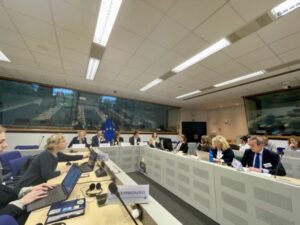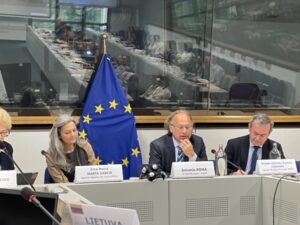
20/10/2023
The meeting identified the legislative, administrative and financial measures that the member states and the European Commission should address in the coming months in order to make further progress in public technical cooperation
Representatives of Foreign Affairs/International Cooperation and Civil Service from Member States have participated throughout Thursday 19 October in the meeting hosted in Brussels by the European Commission – Directorate General for International Partnerships (DG INTPA) and the Spanish Presidency of the EU to promote public technical cooperation (around policies, laws and institutions) as a flagship of cooperation and external action of the EU and its Member States. In addition to creating the enabling environments for the green and digital investments of the Global Gateway [Europe’s global connectivity strategy], public technical cooperation can lay the foundations for the public policies needed for this global change and strengthen the institutions that will be responsible for sustaining it over time and within the reach of all people and territories.
The event has brought together efforts to promote European public technical cooperation and has addressed the joint reflection on how best to mobilise public expertise in European administrations in an ever-changing context and in the face of the challenges of today’s world.
The meeting was opened by Eva del Hoyo, Director General for Sustainable Development Policies at the Spanish Ministry of Foreign Affairs, European Union and Cooperation, demonstrating Spain’s commitment to this form of cooperation. Del Hoyo remarked: “The Spanish Presidency of the Council of the EU firmly believes in the experience of the public sector and in its added value as the main form of cooperation for the EU’s external action“. She developed this idea in the article published in El Grand Continent, where she stresses the idea of a new renewed commitment, pointing out that “European cooperation can work on a double scale, promoting cohesion between different Member States and being a tool that allows strategic partnerships to be established so that the Union can be a geopolitical partner of reference”.
Furthermore, del Hoyo reflects on the nature of the global challenges we face, which can only be addressed through coordinated responses, both at regional and global level: “this way of working reflects the essence of the Team Europe approach”. It is precisely the mobilisation of European Public Expertise that has proven to be “a demand-driven, adaptable, flexible, efficient and cost-effective tool to build capacity in the public sector of our partner countries and promote public policy reform processes based on their needs and priorities and aligned with the 2030 Agenda and the SDGs”.
Almost two years after the European Foreign Affairs Council approved conclusions on the value of public expertise in the European Union’s external action, and 19 months after the Strasbourg Declaration adopted by the ministers of Public Administration, the heads of the two portfolios take stock of the progress made in the roadmap outlined.
Within this framework, the FIIAPP has become a key entity in Spanish and European cooperation for the mobilisation of experts from public administrations in international cooperation projects. During 2022, the FIIAPP mobilised more than 600 public professionals from more than 180 public administrations in Spain and the rest of the EU, and currently has 125 projects under implementation.
FIIAPP Director, Anna Terrón, stressed the importance of “integrating public expertise in the implementation of the Global Gateway strategy and jointly positioning our public sector expertise as a tool to promote shared values and structural partnerships within the EU and with our partners. At FIIAPP we believe that this event is not a point of arrival. Therefore, we are committed to continue this work together within the platform for European Development Cooperation organisations, the Practitioners Network”
FIIAPP’s Director of Strategy, representing the European Practitioners Network, Tobias Jung, stressed that “it is key to bring this debate to the technical level to address the challenges identified in the ‘Good Practice Paper‘ for mobilising public expertise, developed by the European Commission and presented at the event. Since 2017 we have been working with DG INTPA at Practitioners to promote the added value of public expertise”.
 The meeting facilitated technical discussions to exchange strategies and experiences in mobilising public sector expertise. Ricardo Sánchez-Blanco, Deputy Director General for External Relations and EU Trade Affairs at the Spanish Ministry of Foreign Affairs, stressed that “Global Gateway is more than an investment strategy. It is the way the EU wants to project itself to the world. Public expertise must be integrated into the strategy, it is a powerful tool for the EU’s external action“.
The meeting facilitated technical discussions to exchange strategies and experiences in mobilising public sector expertise. Ricardo Sánchez-Blanco, Deputy Director General for External Relations and EU Trade Affairs at the Spanish Ministry of Foreign Affairs, stressed that “Global Gateway is more than an investment strategy. It is the way the EU wants to project itself to the world. Public expertise must be integrated into the strategy, it is a powerful tool for the EU’s external action“.
The conversation highlighted the importance of value-based external action in which it is key to talk about sustainable development results, but also about the return of knowledge and the strategic relevance of the work of development workers for our own policies, administrations and public systems.
Both Elsa Marta García, Chief Inspector of the National Police and FIIAPP’s development worker in NETCOP, a project in Senegal to combat the trafficking and smuggling of migrants, and Antonio Roma, prosecutor and FIIAPP’s development worker in the EL PAcCTO programme, stressed the need to adapt to the context of the country in which they are working.
 In addition, during the event, a good practice document on mobilising the public sector was presented, a key resource to advance the implementation of the EU Council conclusions on European public sector expertise in external action. Prepared by the European Commission, this document identifies good practices and challenges in mobilising public expertise and offers a series of recommendations to Member States to promote this type of cooperation. Implementing these recommendations, defining a new joint roadmap for the promotion of public expertise abroad and aligning technical cooperation with the European Global Gateway strategy are some of the pending challenges that both the European Commission and the Member States will have to jointly address in the coming years.
In addition, during the event, a good practice document on mobilising the public sector was presented, a key resource to advance the implementation of the EU Council conclusions on European public sector expertise in external action. Prepared by the European Commission, this document identifies good practices and challenges in mobilising public expertise and offers a series of recommendations to Member States to promote this type of cooperation. Implementing these recommendations, defining a new joint roadmap for the promotion of public expertise abroad and aligning technical cooperation with the European Global Gateway strategy are some of the pending challenges that both the European Commission and the Member States will have to jointly address in the coming years.


